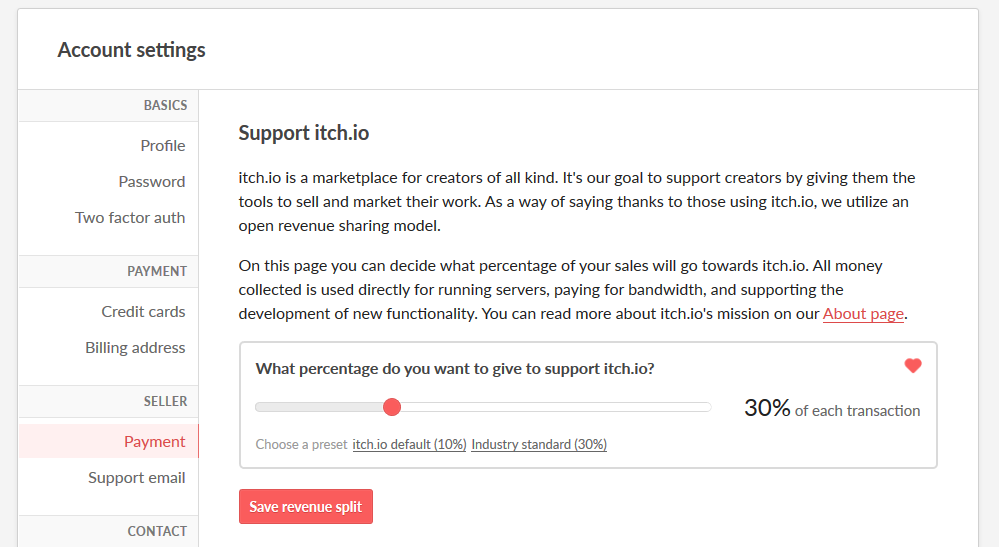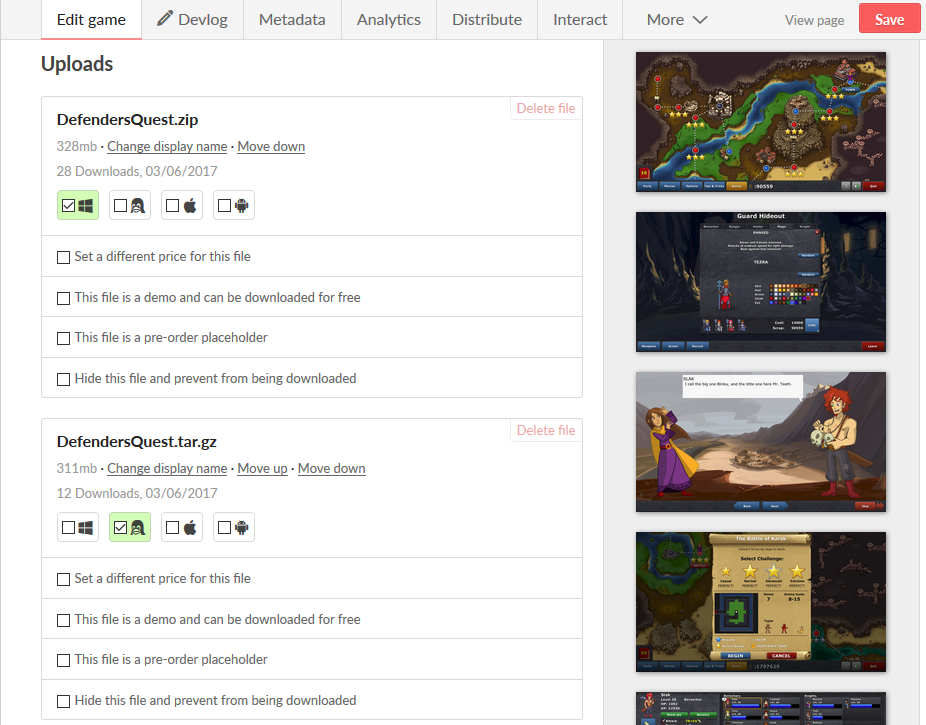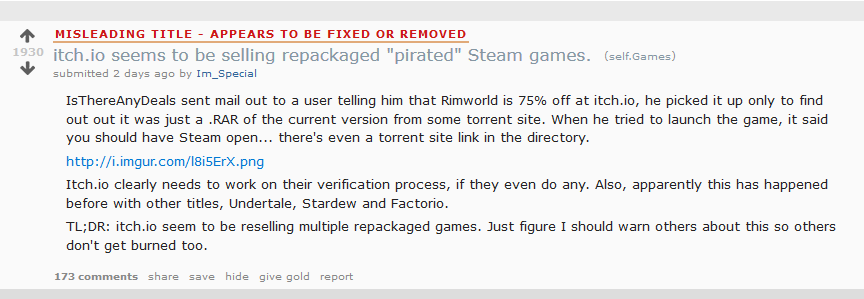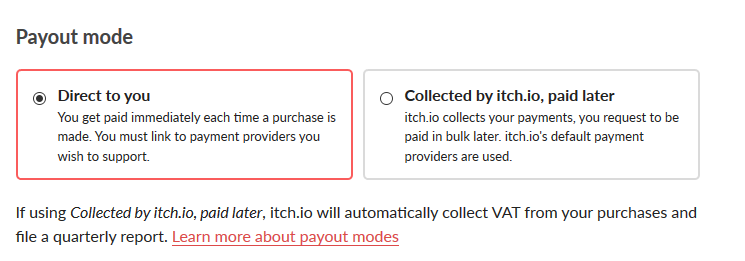Stores vs. Developers vs. Customers vs. Publishers

All of the major game stores (Steam, GOG, Origin, Uplay, itch, etc) serve different groups at the same time, many of which have competing interests. Broadly speaking, they are:
- Customers
- Developers
- Publishers
- The store platforms themselves
You'll often hear complaints about various stores (Steam, most commonly). But something that's not always acknowledged is who is complaining, what their specific interest is, and how it affects the interests of groups other than their own. Given the readership of this blog, chances are you identify most strongly with the interests of developers, customers, or both. However, these groups have different interests and often come into conflict.
Conflicts and Interests
Some conflicts are obvious -- the stereotypically greedy businessmen who leverage their power to put themselves and their rich partners first, at the expense of the customers who pay for their products as well as the developers that toil under bad working conditions to produce them. This is a sadly familiar example in our industry.
Other examples aren't as immediately apparent. As steeped as most of us are in consumption culture, "putting the customer first" sounds like a transparently virtuous ideal. And, to be sure, businesses being good and fair and honest to their customers is certainly a good thing and worth fighting for. But there's limits to everything and there are always trade-offs; just to make a point, the extreme end of being "customer friendly" is to give all your products away for free. This obviously contrived example trades off the entirety of the store's own self-interest (we're bankrupt, yay!), but also burns bridges with the store's suppliers who depend on it for distribution (way to screw us over, buddy!).
Of course, you can be customer-friendly and developer-hostile, playing one constituency off another and saving plenty of upside for yourself. Outside the world of games, this accusation is often leveled at Amazon.com and Wal-mart, who provide amazing deals to customers even as they face criticism for exploiting workers and undermining their own suppliers.
(As a quick aside: Dan Cook's classic The Game of Platform Power is an excellent read on a related topic).
Finally, these groups aren't homogenous and often have conflicts amongst themselves.
Who Do You Serve?
Let's take a broad look at how different PC game stores specialize by favoring different interests (as well as their own). Broadly speaking:
- Origin/Blizzard/Uplay care first and foremost about AAA and publishers.
- GOG cares first and foremost about customers.
- itch cares first and foremost about developers.
- Steam tries to keep each group's interests in relative balance.
All of these come with trade-offs.

These stores are set up primarily so that the mega-publishers that run them (EA, Ubisoft, and Activision Blizzard, specifically) can control the distribution of their own games, with occasional AAA partners along for the ride. Publishers are free to use whatever DRM they like and set whatever terms and conditions they want without a store imposing its own restrictions. They're not free from market competition, however, so in order to compete with Steam and GOG, sites like Origin have actually had to do a pretty good job in making decent clients, something I doubt we'd be seeing if Steam and GOG had never existed (Also, Origin in particular should be commended for instituting a refund policy as early as 2013).
That said, these publishers know the chief thing drawing people in is the leverage of big AAA games. They're exclusive to these platforms, which requires customers to download clients for each specific publisher and submit to whatever DRM they insist on. AAA publisher interests definitely come first, but Steam's dominance in the marketplace requires them to make concessions to customers that I doubt they would be willing to do if they were the market leader.
Also, these sites aren't particularly interested in the needs of non-AAA and indie developers.

GOG puts customers first, with customer-friendly policies like a hardline stance against DRM and a refund policy that dates back to December 2013 (Steam added refunds on June 2, 2015). Furthermore, GOG is tightly curated, insisting on only offering a small selection of games they perceive to be of the best quality.
These policies are seen as good for customers, though they trade-off against the interests of publishers/developers who might want to insist on DRM, aren't happy about refunds, or would just like a chance to sell their games on the store.
DRM
Now, I don't have much sympathy for those who insist on DRM (see Piracy and the Four Currencies for my stance on that topic), but it's just plain true that having this as a blanket policy (rather than leaving the choice to the developers/publishers, as Steam does) means GOG is going to have a much harder time signing the big AAA titles whose publishers flat-out insist on DRM as a precondition.
Refunds
As for refunds, I personally think they're great, even as a developer. I think the best outcome for an angry or disappointed customer is to get their money back. I think I'm much better served by them getting a refund and being satisfied again than holding their money captive and leaving them no recourse other than to leave a negative review*. Also, having readily available refunds lowers the friction of purchase, and gives people a way to "try-and-buy." Since my game has very high demo conversion rates already, this isn't threating to me.
Not everybody agrees with me, though. Some developers feel that refunds are unfair, as they should be the ones to set those terms, not the store. Others feel that it unfairly punishes short-form games, which can be played to completion and then refunded. Most developer resistance seems to concern specific implementation details rather than the fundamental idea of refunds, but I have heard developers who tell me they oppose the idea entirely on the grounds that sales of plenty of other (much more expensive) products and services are final. I don't agree with this personally, but I understand the logic behind it, and it's a clear example of how one group's interests (customers) can conflict with another's (developers).
In any case, on the topic of refunds, GOG sided early with customers.
*To be clear, most refund systems will still let you leave a negative review after a refund, which is the system I support.
Curation
As for curation, we've seen a lot of complaints from customer advocates that Greenlight and now Steam Direct are transforming Steam into "the next App Store." I disagree with that assertion, but we'll save that for another time. What can't be doubted is that the number of games on Steam is increasing:
The number of new games on Steam by month pic.twitter.com/Q2G5RY4ULc
— Steam Spy (@Steam_Spy) June 2, 2017
Stores like GOG are for customers who just want to browse games that they know have been carefully vetted by people whose taste they trust. This severely limits opportunities for developers outside the gates, but many customers don't care as much about that.
Now, GOG has not been perfectly customer-oriented -- for instance, there was that time back in 2010 where they pulled a terrible rebranding publicity stunt by pretending the entire site had folded (along with its entire games library!). It resulted in a major backlash by panicked customers afraid they'd lost their games forever, and it took years for GOG to win back trust.

itch.io puts developers first, and goes to great lengths to do so. First and foremost, itch offers free hosting and an entirely uncurated store. You can put up a store page in minutes without anyone's permission and people can download your game immediately and even give you money for it. Even crazier, you can choose how much of a cut you want to give itch, even 0%!

Having used the backends for all the major stores (except for Origin/Uplay/Blizzard), itch has the best tools. They have an extremely convenient system for uploading new builds, and an intuitive, visual method for arranging them. On other platforms it's very easy for me to accidentally upload a mac build to a windows slot or vice versa and have to re-upload the whole thing. Here you can change platform tags and demo status easily, and you can visually arrange in what order download options appear to the user. All your uploads have conveniently listed timestamps, file sizes, download counts, etc.

These sound like basic things, but I've wasted hours struggling with inferior systems that lack them. Given that itch caters primarily to small and first-time developers, it's much more important for them to have a convenient web uploading interface, whereas the big stores can assume that their clients know their way around a command line uploader.
My favorite feature is simply how easy it is to upload games:

You can upload files directly through the web interface, or side-load through dropbox. This latter is a real time-saver, as developers don't always have good upload connections, and a standard full upload can take an hour or more on a bad connection. Once you've uploaded to Dropbox once, updating the same file will take much less time as only the changes are sent. All you have to do is place your local build into your local machine's dropbox folder, let it sync for a few minutes, then click 'choose from dropbox' on the itch site and have it ready immediately.
And for advanced developers itch offers a best-in-class command line tool called butler, which takes advantage of all the latest research in diffed patching algorithms to make uploads nice and speedy, and most importantly, easy to automate. And best of all - it's Open Source!
So what's the downside to itch?
First of all, it doesn't have many customers. It's incredibly niche, and in its current state is mostly a self-publishing tool. Which is totally fine! I vastly prefer services like itch to the likes of FastSpring and BMT Micro, which used to be our only options for this sort of thing.
There was also this recent controversy:

In a nutshell, what happened was that a scammer exploited a deadly combo involving IsThereAnyDeal.com and itch's uncurated storefront and direct payment system. The scammer downloaded game files for popular games like Stardew Valley and Rimworld from Steam, then uploaded them directly to itch with official assets and branding, and marked them down with a historically low discount. IsThereAnyDeal.com, which regularly scrapes all storefronts looking for such events, immediately blasted out a notification to their large subscriber base. In a world where web systems build off eachother like this, an exploit can move down the pipe fast.
The kicker was that the scammer was using the "Direct to You" payment system:

This meant that instead of holding the money in escrow to give them time to respond to fraudulent purchases, the transaction was routed directly to the scammer's PayPal account. By the time anyone knew what was happening, the money was already irretrievably in the scammer's hands, with PayPal's famously unresponsive support channels the only recourse.
Now, I have to say itch's staff handled the affair with incredible speed and aplomb. Because of the direct pay method, they couldn't refund the purchases, so they paid out refunds from their own money. Then they closed the scammers' accounts, took down the pirated games, and suspended the direct pay method indefinitely. Their chief mistake was not anticipating such an exploit in the first place.
My reading of this situation is that this is a natural blind spot for itch to have, given their focus on putting developers first. I'm by no means trying to punch someone while they're down -- everybody eventually gets hacked and as I said before, itch's response was exactly what it should have been. That said, this exploit was made easier by the fact that putting up anti-fraud safeguards for customers was not itch's top priority, even if it was on their radar.
And to be completely fair, Steam has been playing cat-and-mouse with hacking and copyright rip-off issues of far larger magnitude against far larger scammers for much longer, mostly because they're a bigger and more valuable target. This comparatively small crisis is simply a wake-up call that itch will face many more such growing pains in the future, and will have to find the best way to stick to their principles while balancing everyone's interests.

Steam is the platform that everyone has the most heated opinions about. Precisely because they're the market leader in PC games, everybody wants a piece of them and everybody has an opinion about what they should be doing. Since you've probably heard most of these opinions before, I'll just cover a few topics that highlight the ongoing tug-of-war between groups.
Years ago the common complaint against Steam was that they weren't allowing enough games on to the service. Now, people frequently complain that they're allowing too many.
Personally, having had to get onto the platform "the hard way" prior to greenlight, I can definitely sympathize with this and have always advocated for making the platform more open. It should be noted that this is developer advocacy, however.
And not all developers agree with me. For instance, on the topic of what the Steam Direct fee should be, the majority of developers were in favor of low barriers, but opinion was still split:
Some polls on Steam Direct
— Lars Doucet (@larsiusprime) February 10, 2017
1) privately polling a large group of indie friends
2) my public twitter poll
3) @Steam_Spy 's poll pic.twitter.com/wE1cGHc8BY
On the customer front, Steam has long been criticized for weak customer support, as well as their lack of oversight with regards to new games, both of which are problems greatly multiplied by the massive scale that Steam operates at. Though they were a long time coming, Steam overhauled their support system and implemented human-powered QA reviews of new game submissions. One area Valve could improve on is better communication with the public, many of whom are unaware of these changes even today.
Since Steam Dev Days 2016, there has been a marked uptick in the frequency of public blog posts explaining Valve's reasoning behind upcoming changes, which is a good step in this direction. I should also mention that Steam has pretty good tools and analytics overall.
Who Comes First?
I doubt any specific set of tweaks to Steam is going to please everyone and Steam is ultimately going to choose what they think is best in their own eyes. Steam is like a giant ocean liner; powerful and strong but slow to turn, and responsible for the fate of passengers and crew alike.
Although Steam got to where they are largely by being first to market, they face more competition than ever, not only from the likes of Origin, Uplay, and Blizzard, but also behemoths like Amazon (who recently acquired Twitch), and TenCent, who basically owns the Chinese market. My suspicion is that these large players probably have pretty crappy backends and tools and aren't super interested in indie developers until they've already proven themselves to be big hits, which means Steam will probably still be the first to distribute the next Stardew Valley or Undertale. (Honestly, these big competitors are probably more interested in the next Grand Theft Auto V, anyways).
Steam pursuing more open development was the perfect opportunity for GOG to set itself apart by insisting on curation. I guess we'll see how that goes for them as Steam Direct works itself out.
itch is a really neat project that I don't think will ever grow very large in terms of market share -- it's not always obvious from our little bubble, but Indie games are a tiny fraction of the market. I'm pretty sure the founders are fine with this, honestly -- they seem more interested in creating a sustainable lifestyle business for themselves by providing excellent tools and distribution for small developers, than in taking over the world or getting rich through an acquisition. Not everything has to be about the big bucks.
As for the opinionaters, it's important to remember whose interests they claim to represent, and consider how that aligns with your own. Voices like Rami Ismali are primarily developer advocates, strongly arguing for lowering barriers to entry as much as possible. Developer advocates can and do still care about customers, but developer concerns are foremost on their minds. On the other hand, Youtubers like TotalBiscuit and Jim Sterling are customer advocates, and are more interested in calling out developers (and platforms) they perceive as taking advantage of customers.
It's natural for people to have different goals, it's just easier to understand each other if we first step back and take a look at where everyone's standing.